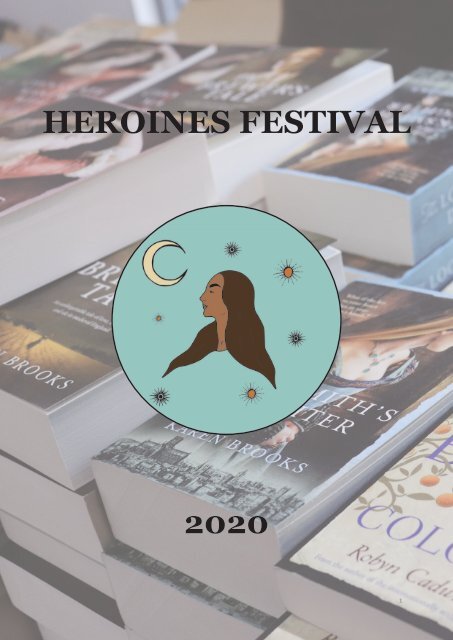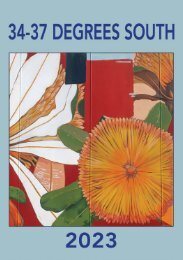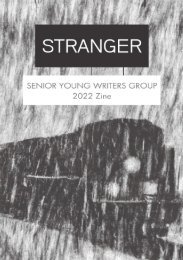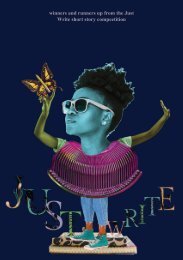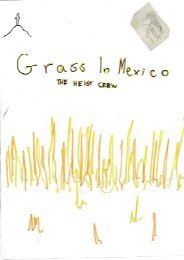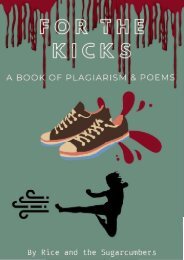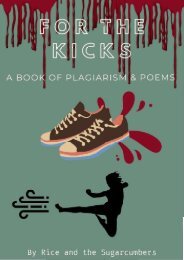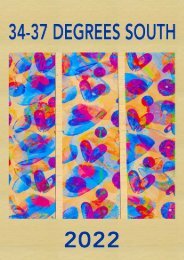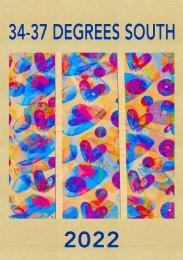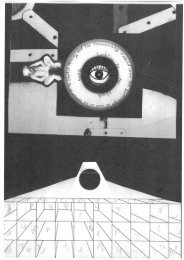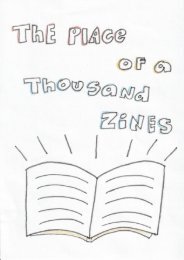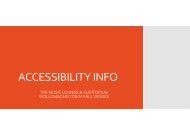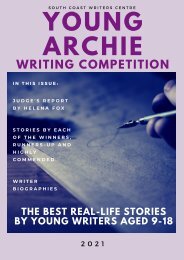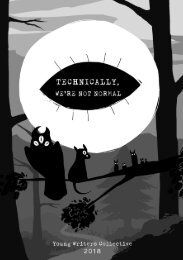Heroines Festival Book Month Program
This is the full program for Heroines Festival's 2020 Book Month.
This is the full program for Heroines Festival's 2020 Book Month.
You also want an ePaper? Increase the reach of your titles
YUMPU automatically turns print PDFs into web optimized ePapers that Google loves.
HEROINES FESTIVAL<br />
2020<br />
1
<strong>Heroines</strong> Literary <strong>Festival</strong><br />
Returns for 2020 with <strong>Heroines</strong><br />
<strong>Book</strong> <strong>Month</strong><br />
The <strong>Heroines</strong> <strong>Festival</strong>, Australia’s first festival of women writers telling women’s<br />
stories, returns for its third year in 2020. For the first time ever, the festival features<br />
a month-long program, the Heroine’s <strong>Book</strong> <strong>Month</strong>, taking place between 15 October<br />
– 15 November. This online program features book clubs, live author discussions and<br />
exclusive writing workshops.<br />
<strong>Heroines</strong> <strong>Festival</strong> <strong>Book</strong> <strong>Month</strong> amplifies and applauds stories told by women, about<br />
women. We invite audiences to take part in our exclusive book groups celebrating<br />
stories of rebellion, survival and resilience. Our panel of authors complement their own<br />
creative works with a curated selection of fiction and memoir by and about women.<br />
Authors will be available throughout the month to discuss their creative practice and<br />
book selections via live Q&A video sessions.<br />
Amra Pajalic will reflect on her mother’s experiences of bipolar disorder and migration,<br />
while S.L Lim’ explores the psychic violence imposed by capital and borders. Bem Le<br />
Hunte considers thresholds between both generations and cultures. Julie Janson will<br />
navigate Aboriginal identity and survival against the backdrop of British colonisation,<br />
while Lee Kofman investigates societal perceptions of bodily “imperfection.”<br />
Authors interrogate the past, uncovering stories of defiant and rebellious women<br />
in Australia and beyond. Victoria Purman and Cathy Perkins will examine feminist<br />
struggles in early 20th century Australia, while Karen Brooks turns to witchcraft trials to<br />
illustrate women’s defiance of authority.<br />
Writing workshops coach writers through the processes of drafting, and creating<br />
dynamic characters. Hayley Scrivenor will encourage aspiring authors to “Write Like<br />
No One is Watching”, to develop their work and create sustainable writing practices.<br />
Lauren Elise Daniels hosts “Writing Rebel <strong>Heroines</strong>”, teaching writers how to create<br />
authentic, fully realised female characters.<br />
Bringing together a diverse community of readers and authors, <strong>Heroines</strong> <strong>Book</strong> <strong>Month</strong><br />
celebrates strength, resilience and courage.<br />
www.theneoperennialpress.com/heroines-bookmonth-2020<br />
2 3
<strong>Heroines</strong> <strong>Book</strong> <strong>Month</strong><br />
Amra<br />
Pajalic<br />
& Things<br />
Nobody Knows<br />
But Me<br />
Guests<br />
<strong>Book</strong>s<br />
Amra Pajalic is an an editor, teacher and<br />
award-winning author. Her debut novel<br />
The Good Daughter (Text Publishing,<br />
2009) won the 2009 Melbourne Prize for<br />
Literature’s Civic Choice Award. She is<br />
co-editor of the anthology Growing up<br />
Muslim in Australia (Allen and Unwin,<br />
2019) shortlisted for the 2015 Children’s<br />
<strong>Book</strong> Council of the Year awards. Her<br />
latest book is a family memoir Things<br />
Nobody Knows But Me (Transit Lounge,<br />
2019) shortlisted for the 2020 National<br />
Biography Award. She is completing a PhD<br />
in Creative Writing at La Trobe University.<br />
www.amrapajalic.com<br />
Amra’s <strong>Book</strong> Club<br />
Nomination<br />
Amra’s <strong>Book</strong> Club Nomination - You Must<br />
Be Layla by Yassmin Abdel-Magied.<br />
A beautiful novel about Layla who is of<br />
Sudanese background and who dreams<br />
of having adventures and inventions and<br />
gets a scholarship to a prestigious high<br />
school. She faces racism and discrimination<br />
but through persistence and courage finds<br />
her way. A great novel that challenges<br />
stereotypes across race and gender Layla<br />
is a strong courageous character that<br />
I loved and that speaks to young girls.<br />
Can’t wait to recommend this book to my<br />
students.<br />
4 5
Cathy<br />
Perkins<br />
& The Shelf Life of<br />
Zora Cross<br />
Cathy’s <strong>Book</strong> Club<br />
Nomination<br />
Cathy Perkins is a writer and editor from Sydney with an<br />
interest in the life stories of forgotten literary figures. Her<br />
recent biography The Shelf Life of Zora Cross uncovers<br />
the life of a once-famous poet, journalist and actress who<br />
published a provocative series of sonnets in 1917. The<br />
Sydney Morning Herald’s Spectrum called the book an<br />
‘imaginatively conceived biography’ and a ‘fascinating<br />
read’, and it was shortlisted for the Australian History<br />
Prize of the NSW Premier’s Literary Awards. Cathy edits<br />
the award-winning SL magazine and other publications<br />
at the State Library of NSW, and has worked as a book<br />
editor, literary agent, bookseller, and for the Australian<br />
Society of Authors. Her essays on Zora Cross have been<br />
published in the literary journal Meanjin.<br />
Cathy’s <strong>Book</strong> Club Nomination - Friends<br />
and Rivals by Brenda Niall<br />
Brenda Niall’s Friends and Rivals is a<br />
vivid account of the intersecting lives of<br />
four Australian women writers in the late<br />
nineteenth and early twentieth centuries:<br />
Ethel Turner, author of the children’s classic<br />
Seven Little Australians, Barbara Baynton,<br />
who wrote of the harshness of bush life,<br />
Nettie Palmer, essayist and critic, and<br />
Henry Handel Richardson, of The Getting<br />
of Wisdom and The Fortunes of Richard<br />
Mahoney fame. Even readers unfamiliar<br />
with the work of these writers will enjoy<br />
this group biography that reveals the<br />
challenges faced by women writers and<br />
illuminates a fascinating time in Australia’s<br />
literary history.<br />
6 7
Karen<br />
Brooks<br />
& The Darkest<br />
Shore<br />
Karen’s <strong>Book</strong> Club<br />
Nomination<br />
Karen Brooks is the author of thirteen<br />
books, a newspaper columnist, and is an<br />
Honorary Senior Research Consultant with<br />
the University of Queensland. She has a<br />
Ph.D. in English/Cultural Studies and has<br />
published internationally on popular culture,<br />
education and social psychology. An awardwinning<br />
teacher, she’s keynoted at education<br />
conferences around the country. Karen’s<br />
first historical fiction, The Brewer’s Tale, was<br />
published to critical and popular acclaim,<br />
becoming a bestseller. Her subsequent works,<br />
The Locksmith’s Daughter – an Elizabethan spy<br />
thriller - and The Chocolate Maker’s Wife, a<br />
Restoration story of love, cruelty, redemption<br />
and chocolate have been successful here and<br />
in the USA/UK. Her latest novel, The Darkest<br />
Shore, is based on the true story of a witchhunt<br />
in Scotland in the 1700s. It features a<br />
group of feisty fishwives and covers themes<br />
such as social justice, the power of female<br />
friendship and resilience in the face of<br />
terrible odds.<br />
Karen’s <strong>Book</strong> Club Nomination - Gulliver’s Wife to revert back to the way it was - with him<br />
by Lauren Chater<br />
at its head and his every need and whim<br />
While most of us either grew up with Jonathan met. This is the story Chater gives us - from<br />
Swift’s satirical travelogue/novel, Gulliver’s the point of view of Mary and her daughter,<br />
Travels, or know the extraordinary adventures Bess, with all its psychological and emotional<br />
of its protagonist, ship‘s surgeon, Lemuel twists and pain. In this tale, Gulliver is not<br />
Gulliver, through various popular culture the heroic survivor of ship-wreck and centre<br />
retellings, not much thought at all is given of a wondrous tale, but a narcissist, unable<br />
to his wife or family who were left behind. to see the damage his return, and inability<br />
Well, Lauren Chater changes that. In Lemuel’s to understand the changes that have been<br />
absence, Mary Gulliver not only provides for wrought while he was away, causes. Filled with<br />
her family through her formidable skills as a lyrical prose, it’s a beautifully, heart-achingly<br />
healer and midwife, but excels. Imagine then, told tale - realistic and raw. I was completely<br />
after attaining liberty, repaying her selfish swept into this story and didn’t want to part<br />
8<br />
husband’s debts and raising her children, her with it.<br />
husband returns, expecting his household<br />
9
Lee<br />
Kofman<br />
& Imperfect<br />
Lee Kofman is a Russian-born, Israeli-Australian author<br />
based in Melbourne. Lee holds a PhD in social sciences<br />
and MA in creative writing. She is the author of three<br />
fiction books, and memoirs Imperfect (Affirm Press, 2019),<br />
which was shortlisted for Nib Literary Award 2019 and<br />
included in <strong>Book</strong>s We Loved 2019 (The Age), and The<br />
Dangerous Bride (Melbourne University Press, 2014),<br />
which was included in Best <strong>Book</strong>s 2014 (The Age and<br />
Australian <strong>Book</strong> Review) and 2015 (The Age). Lee is the<br />
editor of Split (Ventura Press, 2019), which was longlisted<br />
for ABIA Awards 2020, and co-editor of Rebellious<br />
Daughters (Ventura Press, 2016), anthologies of personal<br />
essays by prominent Australian authors. Her short works<br />
have been published in Australia, Scotland, UK, Israel,<br />
USA and Canada, and her writing won numerous awards.<br />
Her blog about writing was a finalist for Best Australian<br />
Blogs 2014. Lee also teaches writing.<br />
More at www.leekofman.com.au<br />
Lee’s <strong>Book</strong> Club Nomination -<br />
Autobiography of a Face by Lucy Grealy<br />
At age nine, Lucy Grealy was diagnosed<br />
with a potentially terminal cancer. When<br />
she returned to school with a third of her<br />
jaw removed, she faced the cruel taunts<br />
of classmates. In this strikingly candid<br />
memoir, Grealy tells her story of great<br />
suffering and remarkable strength without<br />
sentimentality and with considerable<br />
wit. Vividly portraying the pain of peer<br />
rejection and the guilty pleasures of<br />
wanting to be special, Grealy captures<br />
with unique insight what it is like as a child<br />
and young adult to be torn between two<br />
warring impulses: to feel that more than<br />
anything else we want to be loved for who<br />
we are, while wishing desperately and<br />
secretly to be perfect.<br />
Lee’s <strong>Book</strong> Club<br />
Nomination<br />
10 11
S.L<br />
Lim<br />
S.L Lim’s <strong>Book</strong><br />
Club Nomination<br />
& Revenge<br />
S.L’s <strong>Book</strong> Club Nomination - Rat Bohemia<br />
by Sarah Schulman<br />
S. L. Lim was born in Singapore and moved to<br />
Sydney at the age of one. Their award-winning<br />
first novel Real Differences was published by<br />
Transit Lounge in 2019. They have appeared<br />
at literary festivals including Melbourne and<br />
Byron. They are a recent addition to the<br />
transnational Out of the Woods collective,<br />
investigating the twinned nightmares of<br />
capitalism and climate change. They dislike the<br />
global apartheid system of borders as<br />
should you.<br />
First published in 1995, this award-winning<br />
novel, written from the epicentre of the<br />
AIDS crisis, is a bold, achingly honest<br />
story set in the “rat bohemia” of New<br />
York City, whose huddled masses include<br />
gay men and lesbians who bond with one<br />
another in the wake of loss. Navigating<br />
the currents of the city is Rita Mae, a rat<br />
exterminator who holds the optimism of all<br />
true bohemians--those who stand outside<br />
of the prevailing social apparatus. She and<br />
her friends seek new ways to be truthful<br />
and honest about their lives as others<br />
around them avert their glances. Inspired<br />
by A Journal of the Plague Year by Daniel<br />
Defoe, Rat Bohemia is an expansive novel<br />
about coping with loss and healing the<br />
wounds of the past by reinventing oneself<br />
in the city. Rat Bohemia won the Ferro-<br />
Grumley Award for Lesbian Fiction, and<br />
was named one of the “100 Best Gay<br />
and Lesbian Novels of All Time” by the<br />
Publishing Triangle.<br />
12 13
Victoria<br />
Purman<br />
& The Women’s<br />
Pages<br />
Victoria’s <strong>Book</strong><br />
Club Nomination<br />
Victoria Purman is an Australian Top<br />
Ten and USA Today bestselling fiction<br />
author. Her bestselling The Land Girls<br />
was published in April 2019. The Last of<br />
the Bonegilla Girls, a novel based on her<br />
mother’s postwar migration to Australia,<br />
was published in 2018. Her previous<br />
novel The Three Miss Allens became a<br />
USA Today bestseller in April 2019. Her<br />
next novel, The Women’s Pages, will<br />
be published in September 2020. She<br />
is a regular guest at writers festivals, is<br />
a workshop presenter and was a judge<br />
in the fiction category for the 2018<br />
Adelaide <strong>Festival</strong> Awards for Literature.<br />
Written with unerring skill and insight,<br />
The Dyehouse is a masterly portrait<br />
of postwar Australia, when industrial<br />
work was radically transformed by new<br />
technologies and society changed with it.<br />
Mena Calthorpe—who herself worked in a<br />
textile factory—takes us inside this world,<br />
vividly bringing to life the people of an<br />
inner-Sydney company in the mid-1950s:<br />
the bosses, middlemen and underlings;<br />
their dramatic struggles and their loves.<br />
This powerful and affecting novel was first<br />
published in 1961, and is the hundredth<br />
book in the Text Classics series. The new<br />
edition comes with an introduction by<br />
Fiona McFarlane, acclaimed author of The<br />
Night Guest.<br />
14 15
Bem Le<br />
Hunte<br />
& Elephant’s with<br />
Headlights<br />
Bem Le Hunte is Indian by birthright,<br />
British by descent and Australian by<br />
choice. She is the author of several short<br />
stories and four novels. Her latest novel,<br />
Elephants with Headlights, had a carefully<br />
timed release for the month of March<br />
when the COVID-19 lockdowns began! Her<br />
first two novels, The Seduction of Silence<br />
and There, Where the Pepper Grows,<br />
have become number one bestsellers and<br />
been published internationally to critical<br />
acclaim. She is also an Associate Professor<br />
at the University of Technology Sydney,<br />
where she’s the founding Course Director<br />
of the Bachelor of Creative Intelligence<br />
and Innovation, a transdisciplinary, futurefacing<br />
degree that teaches creativity<br />
across 25 different. Before that she had<br />
a career spanning three decades in the<br />
creative industries. She has a BA and MA<br />
in Social Anthropology from Cambridge<br />
University and a Creative Doctorate from<br />
the University of Sydney. Writing has<br />
always been her elemental passion, and<br />
the gift of this calling has allowed her to<br />
flourish in many ways and worlds – well<br />
beyond the written word.<br />
Bem’s <strong>Book</strong> Club Nomination- A Room of<br />
One’s Own by Virginia Woolf<br />
Virginia Woolf’s A Room of One’s Own<br />
was a trailblazing imaginative exercise in<br />
understanding why there were virtually<br />
no women writers in the literary canon.<br />
Placing herself as a researcher in the<br />
‘persona’ of characters like Shakespeare’s<br />
sister (as talented as her brother) she<br />
explored how impossible it would have<br />
been to write fiction in that time unless<br />
you were male.<br />
Bem’s <strong>Book</strong> Club<br />
Nomination<br />
She came up with the famous notion that a<br />
woman had to have a room of her own and<br />
an independent income to write fiction.<br />
Her legacy survives to this day. Without<br />
her there would possibly be no Heroine’s<br />
<strong>Festival</strong>!<br />
16 17
Julie<br />
Jansen<br />
& Benevolence<br />
Julie Jansen is a Burruberongal woman of Darug<br />
Aboriginal Nation, a playwright, novelist and poet. She is<br />
a Co-recipient of the Oodgeroo Noonuccal Poetry Prize<br />
2016 and winner of the Judith Wright Poetry Prize 2019.<br />
Her writing career began when she was a teacher who<br />
wrote and directed plays in remote Northern Territory<br />
Aboriginal communities and took part in traditional Yolngu<br />
ceremonies. Fellowships include an Australia Council<br />
Developing Writer’s Fellowship, two Asialink Residencies<br />
in Indonesia and a Tyrone Guthrie Writing Residency in<br />
Ireland. She wrote her debut novel The Crocodile Hotel<br />
while living in Rome on an Australia Council BR Whiting<br />
Residency. Julie’s historical novel Benevolence Magabala<br />
2020, is an Aboriginal response to colonization and has<br />
been long-listed for the NIB Literary Award 2020. She has<br />
ten produced plays, including two at Belvoir St Theatre,<br />
Black Mary and Gunjies. These plays are published by<br />
Aboriginal Studies Press.<br />
Julie’s <strong>Book</strong> Club Nomination- Song Spirals<br />
by the Gay’wu group of women<br />
The Yolngu clans of North Eastern<br />
Arnhemland have shared knowledge for<br />
thousands of years. Song Spirals is a non<br />
fiction book, written by the Gay’wu group<br />
of women. It explores the essence of every<br />
clan. The women recount how they belong<br />
to the land and it belongs to them, it sings<br />
of the stories that are the heart of creation.<br />
Julie’s <strong>Book</strong> Club<br />
Nomination<br />
18 19
DATE TIME AUTHOR BOOK<br />
Thursday, 15 October<br />
2020<br />
6:30pm - 7:00pm S.L. Lim Revenge<br />
Friday, 16 October 2020 5:00pm - 5:30pm Julie Janson Song Spirals<br />
Saturday, 17 October 2020 2:00pm - 5:00pm Hayley Scrivenor Writing workshop<br />
Sunday, 18 October 2020 12:00pm - 12:30pm Lee Kofman Imperfect<br />
Monday, 19 October 2020 5:00pm - 5:30pm Julie Janson Benevolence<br />
Tuesday, 20 October 2020 7:00pm - 7:30pm Victoria Purman The Women’s Pages<br />
Wednesday, 21 October<br />
2020<br />
Thursday, 22 October<br />
2020<br />
7:00pm - 7:30pm Karen Brooks The Darkest Shore<br />
6:30pm - 7:00pm S.L. Lim Rat Bohemia<br />
Saturday, 24 October 2020 1:00pm - 1:30pm Amra Pajalic You Must Be Layla<br />
Monday, 26 October 2020 7:00pm - 7:30pm Victoria Purman The Dyehouse<br />
Tuesday, 27 October 2020 6:00pm - 6:30pm Cathy Perkins The Shelf Life of Zora<br />
Cross<br />
Wednesday, 28 October<br />
2020<br />
7:00pm - 7:30pm Karen Brooks Gulliver’s Wife<br />
Friday, 30 October 2020 6:00pm - 6:30pm Cathy Perkins Friends & Rivals<br />
Saturday, 31 October 2020 1:00pm - 1:30pm Amra Pajalic Things Nobody Knows But<br />
Me<br />
Saturday, 7 November<br />
2020<br />
7:00pm - 7:30pm Lee Kofman Autobiography of a Face<br />
Sunday, 8 November 2020 11:00am - 1:15pm Lauren Elise Daniels Writing Workshop<br />
Saturday, 14 November<br />
2020<br />
7:00pm - 7:30pm Bem Le Hunte A Room of One’s Own<br />
Sunday, 15 November 7:00pm - 7:30pm Bem Le Hunte Elephants with Highlights<br />
20<br />
2020<br />
21
Kate Forsyth appeared at the 2018<br />
festival on the “Hearing our Grandmother’s<br />
Voices” panel, and again at the 2019<br />
festival discussing the French revolution<br />
and Chinese mythology. While Kate is<br />
best known for her fiction, she has written<br />
a bibliomemoir of their great-greatgreat-great-grandmother<br />
and author of<br />
Australia’s first known children’s book,<br />
Charlotte Waring, with her sister Belinda<br />
Murrell. The book, Searching for Charlotte,<br />
will be published by the National Library<br />
of Australia and will celebrate the 180th<br />
anniversary of Waring’s A Mother’s Offering<br />
to Her Children.<br />
Margaret Morgan’s dark and speculative<br />
novel The Second Cure is an exploration of<br />
a world confronted with a pandemic. It is<br />
eerily relevant in 2020, only two years after<br />
its publication. Excitingly, in 2019 Margaret<br />
announced the novel was being adapted<br />
into a miniseries by Bunya Productions.<br />
Bunya Productions is behind the 2017 film<br />
Sweet Country, winner of 8 different awards<br />
from the Australian Academy of Cinema<br />
and Television.<br />
Catching up with some of <strong>Heroines</strong> <strong>Festival</strong>’s<br />
previous guests<br />
Ceridwen Bush<br />
22 23
Lauren Chater’s second novel, Gulliver’s<br />
Wife, was published in April 2020 to<br />
rave reviews: “Innovative and unique,<br />
this novel was gripping from the very<br />
first page” (Theresa Smith Writes, 2020).<br />
Lauren revisits the classic Gulliver’s Travels<br />
to explore Mary Burton Gulliver. Mary<br />
is a fleeting and limited character in the<br />
original but is reimagined with a voice<br />
and life of her own. Gulliver’s Wife is an<br />
eloquent feat that tackles the historical<br />
underwriting of women’s stories.<br />
Cat Sparks, a multi-award winning<br />
Australian author, editor, artist, and<br />
director of multiple speculative fiction<br />
festivals, completed her PhD in creative<br />
writing entitled Capitalocene Dreams: Dark<br />
Tales of Near Futures & The 21st Century<br />
Catastrophe: Hyper-capitalism and Severe<br />
Climate Change in Science Fiction. Her<br />
forthcoming projects include publications<br />
in the 2020 Dark Harvest anthology and<br />
Cthulhu Deep Down Under Volume 3.<br />
Kerry Turner published her second<br />
historical fiction novel The Daughter of<br />
Victory Lights in January 2020. Karen<br />
Brooks, author of The Locksmiths<br />
Daughter, describes the novel as “an<br />
exquisite, heart-aching tale of love, loss,<br />
rejection and connection all set against the<br />
backdrop of firstly, London during the Blitz<br />
and, later, the post-war years and early<br />
sixties”.<br />
2019 <strong>Festival</strong> guest Monica Tan’s Stranger<br />
Country won the Chief Ministers <strong>Book</strong><br />
Award for Non-Fiction and Jessica White’s<br />
Hearing Maud was shortlisted for the<br />
National Biography Award by the State<br />
Library of NSW.<br />
Robyn Cadwallader appeared on<br />
the “Hearing Our Grandmother’s<br />
Voices” panel at Heroine <strong>Festival</strong> in<br />
2019. Described by Head of Fiction at<br />
HarperCollins, Catherine Milne, as a<br />
“moving and profoundly beautiful novel<br />
of the human impulse towards creativity<br />
and connection”, her second novel, <strong>Book</strong><br />
of Colours went on to be the winner of the<br />
2019 ACT <strong>Book</strong> of the Year.<br />
24 25
Jesse<br />
Blackadder<br />
Vale Jesse Blackadder.<br />
We were so saddened by the passing of author Jesse<br />
Blackadder in 2020. It was a real honour to have Jesse<br />
speak as a featured guest at <strong>Heroines</strong> <strong>Festival</strong> last year.<br />
Jesse was a remarkable woman as evidenced in her<br />
adventures to Antarctica, her historical research and<br />
writing practice, and her work with Byron Writers <strong>Festival</strong>.<br />
Jesse made a significant impact on the Australian literary<br />
landscape, was much loved, and will be greatly missed.<br />
26 27
We were profoundly lucky to be able to host Tara June Winch when she was in Thirroul<br />
in 2019 upon the release of her most recent novel The Yield. The Yield went on to be<br />
awarded three NSW Premier’s Literary Awards: <strong>Book</strong> of the Year, Christina Stead Prize<br />
for Fiction and the People’s Choice Award, as well as the Miles Franklin Award. The<br />
audiobook of her novel was also shortlisted for the Australian <strong>Book</strong> Industry Awards<br />
Audiobook of the year. Tara’s heritage is of the Wiradjuri nation in western NSW, and<br />
she grew up in Woonona but is currently residing in France.<br />
Home<br />
Grown:<br />
Writers from<br />
the Illawarra<br />
28 29
In January 2020, Helena Fox won the Victorian Premier’s<br />
Literary Award for Writing For Young Adults for her debut<br />
novel How It Feels to Float. On top of this, her novel has<br />
been shortlisted for the CBCA Awards, for <strong>Book</strong> of the<br />
Year for Older Readers and the NSW Premier’s Awards,<br />
for the Ethel Turner Prize for Young People’s Literature.<br />
Helena has been spending her time reading and painting.<br />
Chloe Higgins released her memoir<br />
and debut novel The Girls as part of<br />
her PhD study, which won the People’s<br />
Choice Award in the Victorian Premier’s<br />
Literary Awards in January 2020. A heart<br />
wrenching novel of grief and growth,<br />
The Girls was recommended by Readings<br />
Australia for World Mental Health Day. As<br />
well as writing, Chloe has been directing<br />
the Wollongong Writer’s <strong>Festival</strong> since<br />
founding it in 2013.<br />
Film director Zanny Begg appeared at<br />
the 2018 festival on the “Resistance and<br />
Rebellion” panel, where she discusses her<br />
portrayal of historically rebellious women.<br />
In 2019, Zanny was commissioned by<br />
STARTTS (NSW Service for the Treatment<br />
and Rehabilitation of Torture and Trauma<br />
Survivors) to direct Stories of Kannagi, a<br />
short film, featuring three Tamil women<br />
and writers based in Australia, and in<br />
2020 she was commissioned to create a<br />
new digital work by the Australian Centre<br />
for Contemporary Art in Melbourne,<br />
titled Magic Mountains.<br />
30 31
Announcing The <strong>Heroines</strong>/Joyce Parkes<br />
Women’s Writing Prize<br />
Joyce<br />
Parkes<br />
Joyce’s poetry has appeared in literary<br />
magazines, journals and anthologies<br />
in Australia, the UK, Finland, Canada,<br />
Germany, the US, New Zealand, Northern<br />
Ireland, Greece and the Netherlands. The<br />
themes throughout Joyce’s poetry are<br />
often responses to the world around us.<br />
Her work is dynamic and with a distinct<br />
voice. She has written politically, about<br />
worker’s rights, with jarring sentences<br />
and literary allusions; about the Australian<br />
landscape tainted by colonisation, with<br />
powerful metaphors entwined in graceful<br />
prose. She writes of birds and fences,<br />
belonging and leaves - combinations of the<br />
natural world and the human. The life-long<br />
and the quotidian.<br />
Her activism extends beyond her writing.<br />
Joyce was a member of the Western<br />
Australian Discrimination Commission in<br />
the 1970s, unveiling gender, race, and<br />
age discrimination. In the 1980’s she was<br />
a committee member of the Fellowship of<br />
Australian Writers (WA), and later of the<br />
Western Australian Cultural Arts Policy<br />
Committee. In 1991, she presided over the<br />
PEN Perth Centre. Joyce is also the patron<br />
for the Joyce Parkes Women’s Writers’<br />
Prize through the Australian Irish Heritage<br />
Association.<br />
Across history, women have always paved the<br />
way for those that come after – consistently<br />
fighting for futures and recognition that<br />
they never saw. Contemporary women are<br />
making history all around us. Joyce Parkes’<br />
contributions to the literary scene in Australia<br />
reflect this tradition. Based in Balajura,<br />
Western Australia, we are thrilled to announce<br />
that Joyce is the patron of <strong>Heroines</strong>/Joyce<br />
Parkes Women’s Writing Prize.<br />
Each year, the <strong>Heroines</strong> <strong>Festival</strong> has published<br />
an anthology of short fiction and poetry.<br />
2020 will see out third anthology and the first<br />
announcement of our writing awards. Joyce’s<br />
patronage will allow The <strong>Heroines</strong> <strong>Festival</strong> to<br />
offer two significant prizes, for short fiction<br />
and for poetry, from 2021.<br />
32 33
34 35
Read What<br />
Australian Women<br />
are Writing<br />
36 37
The Australian Women Writers Challenge<br />
Reviews and Interviews<br />
The Australian Women Writers Challenge is<br />
run by a team of volunteers, as a response<br />
to the gender division of major reviews of<br />
books - the domain is dominated by male<br />
authors, while novels written by women<br />
neglected. The AWWC doesn’t just want<br />
to challenge newspapers, magazines, and<br />
literary journals, but has invited teachers,<br />
authors, and bloggers to commit to<br />
reading and reviewing more books by<br />
Australian women. The challenge began<br />
in 2012, and the success and international<br />
attention it drew has led it to continue to<br />
2020. The team ensures space for diversity,<br />
outlining books written by Indigenous<br />
women, women with disabilities, and<br />
lesbian and queer women.<br />
From AWCC Review: Historical Fiction<br />
Round Up – Autumn Edition.<br />
Review of The Philosopher’s Daughter by<br />
Alice Booth by <strong>Book</strong>Lover <strong>Book</strong> Reviews<br />
“I was enthralled by The Philosopher’s<br />
Daughters literary narrative. Most<br />
appealing though is the open-mindedness<br />
and respect with which both sisters engage<br />
with the land and all its inhabitants. And<br />
of course, their stories of personal growth<br />
and liberation in having done so. Alison<br />
Booth’s The Philosopher’s Daughters is<br />
quietly moving and captivating historical<br />
fiction.”<br />
A tale of two very different sisters whose<br />
1890s voyage from London into remote<br />
outback Australia becomes a journey of<br />
self-discovery, set against a landscape of<br />
wild beauty and savage dispossession.<br />
London in 1891: Harriet Cameron is a<br />
talented young artist whose mother<br />
died when she was barely five. She and<br />
her beloved sister Sarah were brought<br />
up by their father, radical thinker James<br />
Cameron. After adventurer Henry Vincent<br />
arrives on the scene, the sisters’ lives are<br />
changed forever. Sarah, the beauty of the<br />
family, marries Henry and embarks on<br />
a voyage to Australia. Harriet, intensely<br />
missing Sarah, must decide whether<br />
to help her father with his life’s work<br />
or to devote herself to painting. When<br />
James Cameron dies unexpectedly,<br />
Harriet is overwhelmed by grief. Seeking<br />
distraction, she follows Sarah to Australia,<br />
and afterwards into the outback, where<br />
she is alienated by the casual violence<br />
and great injustices of outback life. Her<br />
rejuvenation begins with her friendship<br />
with an Aboriginal stockman and her<br />
growing love for the landscape. But this<br />
fragile happiness is soon threatened by<br />
murders at a nearby cattle station and by a<br />
menacing station hand who is<br />
seeking revenge.<br />
38 39
Imbi Neemes’ The Spill<br />
Ceridwen Bush<br />
“There was something about the<br />
pressure of the breaks followed by<br />
the release of the accelerator that<br />
made her feel in control again.”<br />
What was the first prompt you had to<br />
write this book?<br />
A friend had a big argument with her sister<br />
about an incident that occurred during<br />
their childhood. Their memory of the<br />
incident was so different, it was almost like<br />
they were talking about two completely<br />
separate events. The fact that two people<br />
who were raised in the same household by<br />
the same parents could experience – and<br />
then remember – something so differently<br />
absolutely fascinated me. I rummaged<br />
around in my own memories, and soon<br />
became fixated on a car accident I’d been<br />
in with my mother and sister, which had<br />
fundamentally changed me. So I decided<br />
to use that as the inciting incident for two<br />
fictitious sisters and their mother.<br />
she ought to live and the life she longs to<br />
live.<br />
What do you think is important for<br />
women who are aspiring to be writers to<br />
know?<br />
That you don’t need hours and hours each<br />
week to write. Nor do you need to make<br />
it perfect the first time. When starting a<br />
new manuscript, I set myself an achievable<br />
word target (250 words) that I make sure<br />
I meet each day. By maintaining that daily<br />
contact with my manuscript, I’m able to<br />
keep the story churning away in my brain<br />
so that by the next time I sit down to do<br />
my 250 words, I’m ready to write.<br />
with a puzzle, the reader doesn’t get the<br />
pieces in order. In the beginning, we are<br />
shown “after the spill” – a car accident,<br />
a drunken mother and an afternoon<br />
of watery lemonade - something that<br />
signposted the end of young Samantha<br />
In the novel, there is a chapter clearly<br />
and Nicole’s parents’ marriage. In the<br />
defined as “The Spill” - what is it about a<br />
middle, we are given the spill itself: the<br />
What did you learn - about anything, moment that marks it as a spill?<br />
Imbi Neeme’s first novel The Spill won the moment the car tumbles too fast around a<br />
including yourself - along your writing In the book, the term “the spill” most<br />
Penguin Literary Award in 2019. It is a fullbodied<br />
examination of relationships and juxtaposed by all the other indistinct spills<br />
Writing has always been a way for me heart of the story. But it’s more than that<br />
bend. The clarity of the spill in the novel is<br />
process?<br />
obviously refers to the car accident at the<br />
trauma. It’s a brilliant story of secrets that sprinkled in, including seemingly unrelated<br />
to emotionally digest experiences or – it’s the spilling of a jigsaw puzzle, the<br />
absorbs its reader through loaded prose material – puzzles, vodka, tears – tiny<br />
feelings (I’ve got decades of journals and spilling of liquid, the spilling of secrets. I<br />
and complicated characters.<br />
things that get lost in a moment.<br />
notebooks as evidence of this!). While I like to make my titles work hard!<br />
The story is told through the interchanging The everyday or usual as traumatic is a<br />
often cannabilise my own life and the lives<br />
perspectives of two sisters: Nicole and concept reminiscent of Virgina Woolf’s<br />
of those around me, I try to do so with as “The Spill” has a form that is deeply<br />
Samantha. A formal choice that exemplifies Mrs. Dalloway. Woolf presents a similar<br />
much kindness and empathy as I can and interwoven with the experience of<br />
the novels themes of perception and juxtaposition of trauma: veteran Septimus<br />
to move as quickly as possible into the trauma. What did the process of writing<br />
memory, but also puts the experience of Smith and his explicit, visual, postwar<br />
trauma, and Clarissa Dalloway’s<br />
I have little control over how people close Because I’ve never felt my own memory<br />
realm of fiction. However, I’ve learned that something non-linear look like for you?<br />
women at the forefront of the plot. The<br />
diversity of secondary characters, both dissatisfaction with life and longing for<br />
to me read my writing and that they’ll is particularly linear, I had this idea of<br />
men and women, is refreshing – nothing past connections. Like Woolf, Imbi Neeme<br />
often find themselves in places I haven’t structuring the book like a giant jigsaw<br />
virtue signalling or irredeemably evil, just presents the reader with a traumatic event<br />
put them!<br />
puzzle, where I give the readers pieces<br />
fully-fleshed. Despite never being in the so clear, it indirectly highlights the many<br />
from different parts of the puzzle one at a<br />
spotlight, I was fond of Nicole’s partner, stitches of trauma in everyday life.<br />
What would your ideal reader experience time. Slowly, they are able to connect the<br />
Jethro. Imbi shows us not only Nicole and The Spill, just like it’s protagonists, is<br />
with this book look like?<br />
pieces and see the bigger picture.<br />
Jethro’s first interaction – playful, awkward full of cryptic secrets. It is a series of<br />
I would hope it would make people reflect<br />
– but Jethro’s and Samantha’s – hostile and scattered pieces: to understand is to work<br />
on their own family relationships and The writing process relied heavily on a big<br />
uncomfortable. These little interactions backwards, something impossible in the<br />
consider that there might be more to the spreadsheet I created to manage all the<br />
are something that tie all of the characters real world. Finally, in “Before the Spill”, the<br />
past than they’ve remembered.<br />
different puzzle pieces. It allowed me to<br />
together. No moment is truly insignificant reader learns something that Samantha<br />
sort the chapters in chronological order<br />
in The Spill, nor in reality.<br />
and Nicole never will. With this framework,<br />
What are you reading at the moment? as well as in the order they appear in the<br />
The Spill is a novel set against a backdrop the novel becomes a commentary on<br />
I’m just starting ‘No Small Shame’<br />
novel, as well as track character’s ages.<br />
of two Australia’s: the 1980’s and now. It memory, truth, and trauma. Ultimately,<br />
by Christine Bell. I met Christine at a<br />
is a novel surrounding the spill: a clearly The Spill is a beautifully critical analysis of<br />
workshop late last year and have been<br />
defined moment in time, presented individual reality, and the trauma entwined<br />
itching to read this, her debut novel. Set<br />
differently in the beginning, middle, and in everyday life.<br />
during the first world war, a woman is<br />
end of the novel. It gives this feeling of<br />
forced to make a decision between the life<br />
collecting memories, or “pieces”. Just as<br />
40 41
Walking, an interview with Kim Kelly<br />
Ceridwen Bush<br />
Australian writer Kim Kelly is the author of<br />
ten books. Her novel Walking, set across<br />
two devastating wars and two great<br />
romances, is inspired by a true story of<br />
medical genius and betrayal. It is crisply<br />
told tale of bigotry and obsession, love<br />
and loss, that charts the path of a young<br />
woman finding her feet in the world, and<br />
the power of kindness that drives her own<br />
ambition.<br />
What was the first prompt you had to<br />
write this book?<br />
Years ago, while researching my first novel,<br />
Black Diamonds, I came across the reallife<br />
story of a brilliant surgeon, Max Herz.<br />
His story was so big, he deserved his own<br />
novel: a Jewish German-Australian, he<br />
was persecuted, betrayed and imprisoned<br />
during the First World War, but never<br />
swayed from his dedication as a doctor,<br />
particularly in treating children – to their<br />
parents, he was the hero who had enabled<br />
their children to walk. He changed the lives<br />
of thousands of Australian kids.<br />
It took me a long time to work out how<br />
to tell his story, though. The crucial spark<br />
only came when I found the sole biography<br />
written about him, by an ex-patient, Joan<br />
Clarke. Suddenly, the character of Lucy<br />
Brynne stepped into my imagination as the<br />
heart and driving force of the novel. Lucy<br />
would tell not only the doctor’s story but<br />
her own, as an ex-patient and a medical<br />
professional herself. Once I’d made the<br />
decision to fictionalise the doctor as well,<br />
calling him Hugo Winter, then we were<br />
ready to set off on the writing adventure<br />
together.<br />
What did you learn - about anything,<br />
including yourself - along your writing<br />
process?<br />
I learned a lot about early 20th-century<br />
orthopaedics! I also found a deeper<br />
understanding of how challenging it is<br />
for a woman to be ignored professionally<br />
in medicine, and how the dismissal<br />
of her opinion can have devastating<br />
consequences not only for herself but her<br />
patients.<br />
Personally, each novel is a new mountain<br />
to climb, and I never stop learning in any<br />
technical sense, but one thing I always<br />
relearn about myself is tenacity. I have to<br />
find the courage to continually renew my<br />
love and respect for my work over the long<br />
road, and that’s not always easy, but it’s<br />
always worthwhile.<br />
What would your ideal reader experience<br />
with this book look like?<br />
An emotional journey through love in all its<br />
forms, and one that shows how kindness is<br />
the greatest gift of healing we can share.<br />
I hope readers feel a sense of building<br />
confidence throughout the tale, so that<br />
by the end, they want to step back into<br />
the world with renewed determination<br />
themselves.<br />
What are you reading at the moment?<br />
I’m absolutely delighting in The Mermaid<br />
and Mrs Hancock by Imogen Hermes<br />
Gowar right now, and looking forward<br />
to The Dictionary of Lost Words by Pip<br />
Williams.<br />
What do you think is important for<br />
women who are aspiring to be writers to<br />
know?<br />
I’ve worked in publishing for over 20 years<br />
as a book editor and seen a few interesting<br />
things in that time. The industry is not<br />
always the kindest place – it is there to<br />
make money – so be very wary of pinning<br />
any hopes on the brand of success the<br />
industry promises. Dig deep into the<br />
reasons you want to write, give your<br />
work the purpose, honour and respect<br />
it deserves. You be the one to decide<br />
what success means to you, and whatever<br />
happens, make your best and most<br />
beautiful work while you can. Don’t wait<br />
for permission; seek only the validation<br />
of those who will engage with your work<br />
constructively and help you build your<br />
skills. No matter where you are along your<br />
writing road, remember this is a long game<br />
– and it’s your game.<br />
Walking is inspired by a true story. How<br />
did you decide what to keep and what<br />
must be left out?<br />
I usually throw out all sorts – anything that<br />
digresses too far from the steady unfolding<br />
of story or character – but Walking was<br />
a little different. Because I began with<br />
a sketch of real-life facts, I slowly built<br />
the characters and story threads around<br />
it in my imagination as I gained more<br />
information. When it came time to write<br />
it, it came out as a whole thing and didn’t<br />
change that much through the editing<br />
process – apart from lots of polishing.<br />
What do you do with elements that don’t<br />
make the final edit?<br />
Nothing is ever wasted – except for<br />
embarrassingly bad sentences that must<br />
get straight in the bin. It’s always a lovely<br />
thing when a chunk of research finds new<br />
relevance, or a storyline I couldn’t use in<br />
one novel, finds its way into another. That’s<br />
how Walking began.<br />
What is the relationship between love,<br />
medicine, and health for you?<br />
Walking is dedicated to my wonderful<br />
friend, Dr Liz Hovey, who embodies the<br />
way love and science can combine to<br />
change lives for the better – just as my<br />
characters Lucy and Hugo do. Without<br />
compassion a doctor can be plain<br />
dangerous, as the novel illustrates, too;<br />
but a doctor who becomes over-involved<br />
can lose their critical distance. It can be a<br />
tricky balancing act, for sure.<br />
These challenging COVID-19 times we’re<br />
experiencing right now have brought into<br />
sharp focus how essential this relationship<br />
between love, science and health can be.<br />
Our best medical professionals are all in<br />
one way or another grappling with a virus<br />
that has as yet no cure; our lives are in<br />
their hands. They truly are heroes, and<br />
deserve our love in return.<br />
42 43
Every Woman’s Guide<br />
to Retirement<br />
Experienced lawyer Alice Mantel writes as<br />
a friendly, wise adviser to clearly explain<br />
the complex situations that many women<br />
encounter during retirement. Her guide,<br />
Every Woman’s Guide to Retirement<br />
responds to the fact that women<br />
experience retirement differently to men.<br />
Women generally live longer, have less<br />
money and volunteer more than their male<br />
counterparts. During the last third of her<br />
life, women often takes on many roles –<br />
caring for parents, children, grandchildren<br />
and partners – that often leave them<br />
little time for themselves. Every Woman’s<br />
Guide to Retirement offers personal and<br />
comprehensive guidance using researched<br />
information and case studies to assist<br />
women to prepare and make the most of<br />
their retirement.<br />
Alice spoke with Alice Dale of the Law<br />
Society. She explained that she started<br />
writing this book before she retired: “I<br />
was initially doing research to answer my<br />
own questions. Years ago, when placing<br />
my mother into a nursing home, I realised<br />
how difficult it was to find any sensible<br />
information to assist me. More recently,<br />
I wanted some guidance when I was<br />
thinking about closing my practice. After<br />
a while, I decided that most books or<br />
articles did not seem very relevant to me.<br />
They were often very friendly but aimed<br />
at chaps who were fairly well off or aimed<br />
at women who presumably intended<br />
to spend the last third of their life on<br />
continual holidays. My research gradually<br />
grew into a book that is far more extensive<br />
than I had ever contemplated and includes<br />
mundane topics like accessing your<br />
pension as well as more interesting options<br />
such as lifelong learning or starting a new<br />
relationship.”<br />
What issues specifically apply to women?<br />
I see retirement as very different for<br />
women than men. Generally, women are<br />
the main carers for their parents, children,<br />
partners and grandchildren. At the same<br />
time, they come into retirement with<br />
significantly less financial resources but live<br />
on average five years longer. If they do not<br />
have enough resources, those last years<br />
are going to be close to living in poverty.<br />
It can be a very grim prospect if a woman’s<br />
health begins to suffer and there is not<br />
always the certainty that your children will<br />
be there to look after you.<br />
What about social planning for<br />
retirement?<br />
Most women retiring today can expect to<br />
have another 20 years of relatively good<br />
health, so it simply isn’t enough to plan<br />
your one big overseas trip and think that’s<br />
all there is to it. For working women, one<br />
of the major issues around retirement is<br />
the loss of their work identity, the loss of<br />
income and the social connectedness that<br />
professional life brings. We need to plan<br />
at least a year ahead of retirement about<br />
how we can use our skills and experience<br />
in the non-employment sphere – and let<br />
me assure you, that is a very large sphere.<br />
There are so many not-for-profit agencies<br />
looking for directors on their boards or<br />
volunteers for their operations. Not having<br />
to follow a work routine means you can<br />
finally pursue your real passion – whether<br />
it is art, woodwork, or caring for your<br />
grandkids and even if it might take a little<br />
time to find what that is, it will give real<br />
meaning to the legacy you leave.<br />
Quotes from “Six minutes with Alice<br />
Mantel” by Alice Dale, Law Society Journal<br />
online.<br />
44 45
SPONSORS<br />
Owned by two sisters, our<br />
local bookstore, Collins<br />
<strong>Book</strong>sellers at Thirroul is<br />
a supporter of <strong>Heroines</strong><br />
<strong>Festival</strong><br />
46 47<br />
www.theneoperennialpress.com/
48


